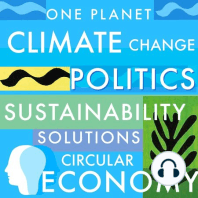20 min listen

Highlights - Walter Stahel - Architect, Founding Father of Circular Economy - Founder-Director, Product-Life Institute
Highlights - Walter Stahel - Architect, Founding Father of Circular Economy - Founder-Director, Product-Life Institute
ratings:
Length:
18 minutes
Released:
Nov 3, 2022
Format:
Podcast episode
Description
"We have to solve three problems. We have to create a low-waste society through incentives to change individual behavior from consumer to user through loss and waste prevention, and intelligent resource management. We also have to create a low-carbon society by preserving the water, electricity, and CO2 emissions embodied in physical assets or through innovation in green electricity and circular energy. And the third challenge, which is probably the biggest, we have to create a low anthropogenic mass society by preserving these existing stocks of infrastructure, buildings, equipment, vehicles, and objects. The only strategy I know that can fulfill these three challenges is a circular industrial economy.Now the last point, low anthropogenic mass society is simply because some years ago, the rapidly growing anthropogenic mass has become bigger than the world's biomass. And that of course means we are destroying the biomass because we have a limited planet, and we are destroying biodiversity and replacing it with synthetic manmade materials and objects. And this in the long term means we are killing ourselves, so we have to stop producing anthropogenic mass, except in countries that don't yet have sufficient infrastructures for education, health, living, and sufficient food to feed the population."Walter R. Stahel is the Founder-Director of the Product-Life Institute (Switzerland), the oldest established consultancy in Europe devoted to developing sustainable strategies and policies. He is Senior Research Fellow at the Circular Economy Research Centre, Ecole des Ponts Business School and Visiting Professor in the Department of Engineering and Physical Sciences, University of Surrey. He is also a full member of the Club of Rome. He was awarded degrees of Doctor honoris causa by the University of Surrey, l’Université de Montréal, and the 2020 Thornton Medal of the Institute of Materials, Minerals and Mining. He is the author of The Circular Economy: A User’s Guide.www.product-life.orgwww.routledge.com/The-Circular-Economy-A-Users-Guide/Stahel/p/book/9780367200176www.oneplanetpodcast.orgwww.creativeprocess.info Instagram @creativeprocesspodcast
Released:
Nov 3, 2022
Format:
Podcast episode
Titles in the series (100)
(Highlights) ROB BILOTT: Interviewed by Mia Funk & Dayana Gonzalez · Associate Podcast Producer Dayana Gonzalez by Sustainability, Climate Change, Renewable Energy, Politics, Activism, Biodiversity, Carbon Footprint, Wildlife, Regenerative Agriculture, Circular Economy, Extinction, Net-Zero · One Planet Podcast